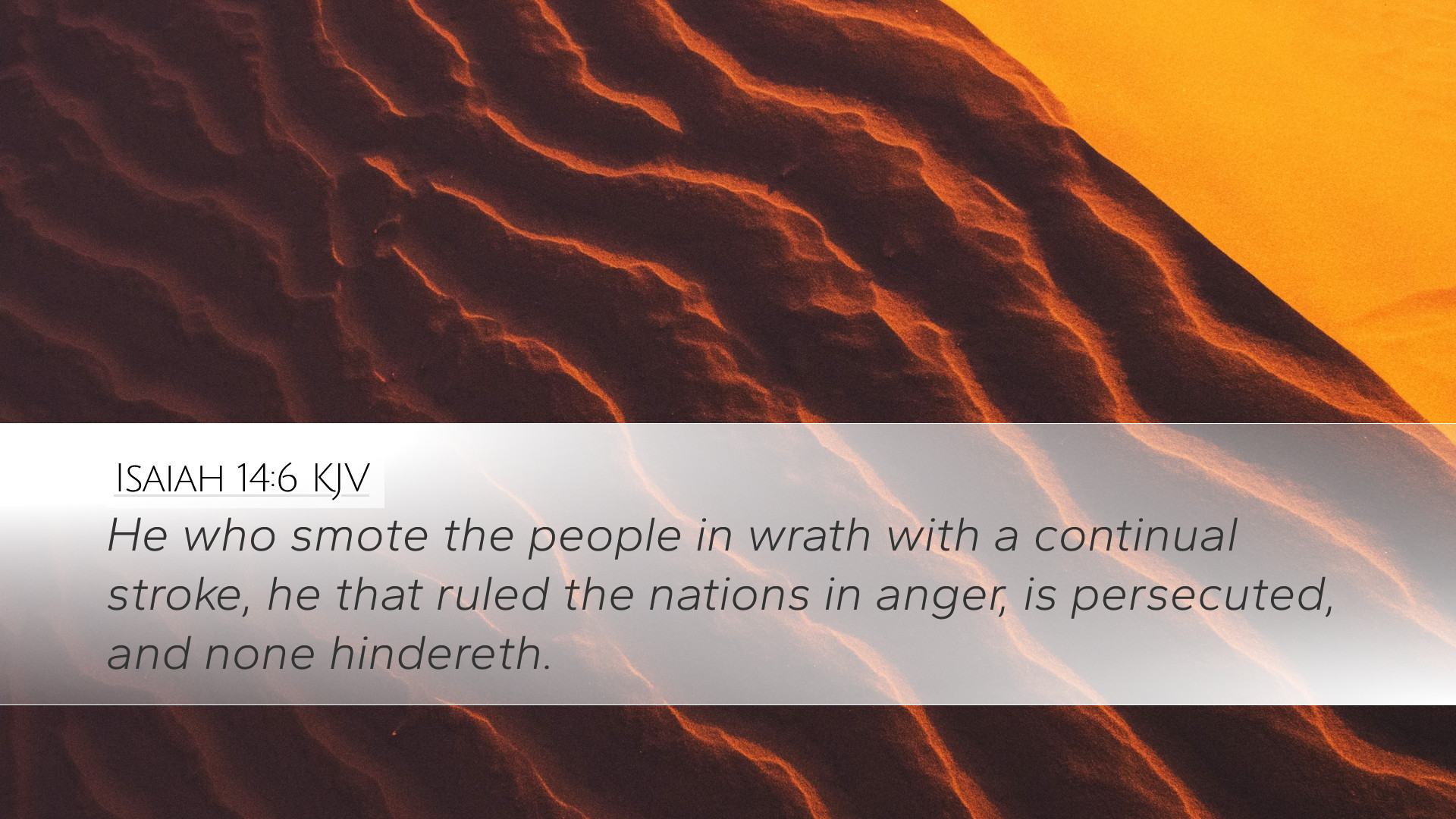Commentary on Isaiah 14:6
Isaiah 14:6 states: "He who struck the people in wrath with a relentless blow, he who ruled the nations in anger, is persecuted and unrestrained." This verse forms part of a passage often understood in the context of the fallen state of Babylon and its king, symbolizing not merely a historical event but an expression of the broader cosmic struggle between good and evil.
Contextual Overview
The Book of Isaiah is rich in prophetic content and reflects significant moments in the history of Israel. This particular passage is often associated with the taunt against the King of Babylon (Isaiah 14:4-21), where God speaks a word of judgment against oppressors and empowers the oppressed.
Thematic Insights
In verse 6, the emphasis is placed on the characteristics of tyranny and oppression manifested by the ruler of Babylon. The commentary by various scholars provides several thematic insights:
- Divine Justice: Matthew Henry notes that this verse illustrates God's nature as a just judge. Babylon, characterized by its militarism and oppression, is brought to ruin, emphasizing that God will ultimately avenge the injustices committed against His people. The relentless blow indicates both the severity of the oppression and the eventual recompense that befalls tyrants.
- The Nature of Oppression: Albert Barnes highlights that this verse catalogues the oppressive methods of rulers who wield indefatigable power over nations and people. The depiction of the king as 'persecuted and unrestrained' serves as a reminder that the power of such oppressors is both temporary and susceptible to divine intervention.
- The Role of God’s Sovereignty: Adam Clarke emphasizes the sovereignty of God over the nations. The historical narrative often showcases the rise and fall of empires. This scripture reinforces that while earthly powers can appear invincible, they operate under the sovereignty of the Almighty, who ultimately determines their fate.
Interpretive Challenges
The interpretation of Isaiah 14:6 has undergone various understandings throughout the centuries. Scholars have debated the historical reference and the wider symbolic implications of 'Babylon.' Is it solely a reflection on the ancient empire, or does it echo across time, perhaps even embodying the spirit of any oppressive regime?
The Implications for Believers
This passage carries profound implications for modern believers:
- Hope in Adversity: For those struggling under oppression, whether it be personal, social, or systemic, Isaiah 14:6 serves as a reminder that God sees their suffering and promises eventual justice. It instills hope that oppressive forces will not triumph forever.
- Encouragement in Faith: As pastors and theologians, the call to proclaim God’s justice should be rooted in the understanding that God is not indifferent to the state of the oppressed. The verse invites leaders to speak truth to power and to encourage congregations to place their faith in a God who liberates.
- The Call to Righteousness: The oppressive actions attributed to the king underscore a broader moral lesson for believers. Engaging in justice and resisting oppressive practices align with the character of God. This conviction challenges believers to actively pursue righteousness in their lives and communities.
Conclusion
Isaiah 14:6 is not just a historical reflection on Babylon's rule; it serves as a beacon of theological truth. The insights drawn from public domain commentaries establish this passage as a critical reminder of both God’s sovereignty and justice. For pastors, students, and scholars, this scripture reinforces an understanding of divine intervention in human affairs and the hope that lies within God's promises.


